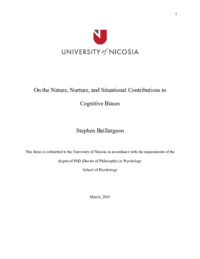- Baillargeon, Stephen
- Psychology
- 20 April 2025
- English
- 176
- Hergovich, Andreas
- Senft, Birgit | Nechtelberger, Franz
- Bias | Self- compassion | Autism | Values | Meta-analysis | Motivation | Self-improvement | Self-serving Bias | Self-enhancing bias | Self-serving Attribution Bias | Better than Average Effect | Confirmation Bias | Grit | Truth-seeking Values | Impression Management | Impression Management Values
- Autism -- Self- compassion
-
-
Study 1:
Self-Compassion Fails to Reduce Cognitive Bias’s Effect on Well-Being
Self-enhancing cognitive biases have been shown to have a positive effect on general well-being (Alicke & Sedikides, 2010). While biases may seem to be worth reducing, it is important to do so without inadvertently reducing their positive effects. However, if they exist to help individuals come to positive conclusions about themselves, then a construct like self-compassion, that may replace the need for positive judgements with unconditional acceptance, could reduce the need for biases. The present research uses non-linear regression to assess the role self-compassion plays in moderating the relationship between bias and well-being. It was found that the relationship is
unaffected, with bias positively associated with well-being and negatively associated with depression with slopes uninfluenced by a person’s level of self-compassion.
Study 2:
Self-Compassion and Motivation for Self-Improvement: A Meta-Analysis
Self-compassion, defined as a mindful, unconditional acceptance and kindness one directs to oneself, has been shown to have positive effects on well-being and mental health, but it could be speculated to have an undesirable impact on motivation. If self-acceptance is conditional, then the threat of self-loathing no longer drives the desire for someone to improve themselves. In contrast, the reduction in pressure and increase in mood could play a positive role. Using data from 45 different articles and a total sample size of 13,558, the meta-analysis demonstrated conclusively that self-compassion is positively, not negatively, (r = 0.25) correlated to motivation. This only
affected intrinsic, not extrinsic, motivation, and was true across cultures, in experimental studies, and in unpublished research, in spite of moderate concerns surrounding heterogeneity.
Study 3:
Impression Management and Truth Seeking Values, Autism, and Cognitive Bias
Cognitive biases are notoriously difficult to diminish. This may be because they relate to genetic or crystalized individual differences or because their presence depends more on the situation. It has been speculated that confirmation bias serves impression management purposes (Trivers, 2011),keeping our reputations high even when we’re given evidence that we are wrong about 3 something. The current research tests this using a within-participants experimental survey, measuring confirmation bias in imagined situations where changing one's mind would be public vs private to
compare the impact of impression management. Impression management as a value was measured, alongside truth-seeking values, to assess their relationship with confirmation bias as well as the Better than Average Effect. Since both values have been shown to be closely related to autism, this was measured using a novel survey designed to understand it better from a social psychological perspective, testing its direct effect on bias, and its potential indirect effects through its influence on values. The impression management situation caused a significant increase, while
autism was associated with higher truth-seeking and, surprisingly, impression management values, neither of which had any reductive effects on cognitive bias.
-


